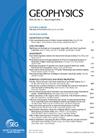流型和速度场对水平井油水两相流量的影响
IF 3.2
2区 地球科学
Q1 GEOCHEMISTRY & GEOPHYSICS
引用次数: 0
摘要
在井筒中,任何流量的变化都会导致流态和速度的变化。流型和流速是决定压力梯度和含液率的关键参数。为了研究流型和速度场对水平井油水流动流量的影响,应用商业软件包ANSYS Fluent 2020 R2对水平井的流型、持水量、压力梯度、流量和速度场进行了预测。利用Trallero的流型图和已有的实验数据验证了模型的可靠性。我们建立了一个简化的持水率数学模型,并与现有模型进行了比较。该数学模型可能局限于模拟方法中流体性质的范围。数值模拟所得的含水率与实验数据有一定的相关性。通过对比Nicolas模型的数值模拟结果,验证了滑移速度与持水率之间的关系,验证了模拟结果的可靠性。仿真结果表明,流型的变化对流量的变化高度敏感。当流型为分层流时,模拟流场的相对误差较小。当流型为分散流动时,模拟流动的相对误差略大。石油主要集中在高速核心区。在较高的总混合速度下,流动形式为分散流动,一相在另一相中均匀混合。仿真结果与实验结果在定性和定量上都有较好的一致性。本文章由计算机程序翻译,如有差异,请以英文原文为准。
Effect of flow patterns and velocity field on oil-water two-phase flow rate in horizontal wells
In a wellbore, any change in flow rate will result in a change in flow pattern and velocity. The flow pattern and velocity are the key parameters that determine the pressure gradient and liquid holdup. To study the effect of the flow pattern and velocity field on the flow rate of oil-water flow in horizontal wells, we apply the commercial software package ANSYS Fluent 2020 R2 to predict the flow patterns, water holdups, pressure gradients, flow rates, and velocity fields of horizontal wells. Trallero’s flow pattern chart and existing experimental data are used to verify the reliability of the model. We develop a simplified mathematical model of water holdup and compare it with existing models. This mathematical model may be limited to the range of fluid properties in the simulated method. The water holdup of the numerical simulation has a definite correlation with the experimental data. By comparing the numerical simulation results of the Nicolas model, the relationship between the slip velocity and water holdup is verified, and the reliability of the simulation results is verified. The simulation results demonstrate that the change in flow pattern is highly sensitive to the change in flow rate. When the flow pattern is stratified flow, the relative error of the simulated flow is small. When the flow pattern is dispersed flow, the relative error of the simulated flow is slightly larger. The oil is mainly concentrated in the high-velocity core area. At a higher total mixing velocity, the flow pattern is that of dispersed flow, with one phase uniformly mixed in the other phase. The simulation results have good qualitative and quantitative agreement with the experimental results.
求助全文
通过发布文献求助,成功后即可免费获取论文全文。
去求助
来源期刊

Geophysics
地学-地球化学与地球物理
CiteScore
6.90
自引率
18.20%
发文量
354
审稿时长
3 months
期刊介绍:
Geophysics, published by the Society of Exploration Geophysicists since 1936, is an archival journal encompassing all aspects of research, exploration, and education in applied geophysics.
Geophysics articles, generally more than 275 per year in six issues, cover the entire spectrum of geophysical methods, including seismology, potential fields, electromagnetics, and borehole measurements. Geophysics, a bimonthly, provides theoretical and mathematical tools needed to reproduce depicted work, encouraging further development and research.
Geophysics papers, drawn from industry and academia, undergo a rigorous peer-review process to validate the described methods and conclusions and ensure the highest editorial and production quality. Geophysics editors strongly encourage the use of real data, including actual case histories, to highlight current technology and tutorials to stimulate ideas. Some issues feature a section of solicited papers on a particular subject of current interest. Recent special sections focused on seismic anisotropy, subsalt exploration and development, and microseismic monitoring.
The PDF format of each Geophysics paper is the official version of record.
 求助内容:
求助内容: 应助结果提醒方式:
应助结果提醒方式:


